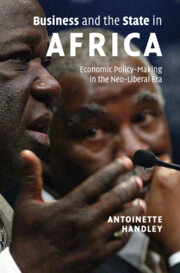Book contents
- Frontmatter
- Contents
- List of figures
- Acknowledgments
- List of abbreviations
- Introduction: the African business class and development
- Part one Institutionalizing constructive contestation
- 1 Ethnicity, race, and the development of the South African business class, 1870–1989
- 2 The neo-liberal era in South Africa: negotiating capitalist development
- 3 Business and government in Mauritius: public hostility, private pragmatism
- Part two Business and the neo-patrimonial state
- Conclusion: the business of economic policy-making, comparatively speaking
- Bibliography
- Index
2 - The neo-liberal era in South Africa: negotiating capitalist development
Published online by Cambridge University Press: 22 September 2009
- Frontmatter
- Contents
- List of figures
- Acknowledgments
- List of abbreviations
- Introduction: the African business class and development
- Part one Institutionalizing constructive contestation
- 1 Ethnicity, race, and the development of the South African business class, 1870–1989
- 2 The neo-liberal era in South Africa: negotiating capitalist development
- 3 Business and government in Mauritius: public hostility, private pragmatism
- Part two Business and the neo-patrimonial state
- Conclusion: the business of economic policy-making, comparatively speaking
- Bibliography
- Index
Summary
I want to be a black Harry Oppenheimer.
(Tokyo Sexwale, former ANC guerrilla and premier of Gauteng Province, subsequently Director of Mvelaphande Holdings)In 1994, what had been “inconceivable” in South African economic policy-making came to pass. At a gathering of the world's political and economic leaders in Davos, Switzerland, Nelson Mandela committed his country to wide-ranging economic reform that, far from moving in the direction of nationalization, pledged to advance privatization.
This is a striking outcome in a country where the new black majority government, described as “quite far left of centre,” had every reason to be hostile to a predominantly white business community. Business was tainted by its association with apartheid. In addition, the ANC was considered to be under pressure from the majority black population to end years of white economic privilege and increase state spending on welfare and poverty alleviation. Reinforcing these pressures was the ruling Congress' formal political alliance with the South African Communist Party (SACP) and the Congress of South African Trade Unions (COSATU), both of which explicitly advocated leftist economic policies. Yet, by the end of the 1990s, the ANC government had consolidated a moderate – even conservative – set of economic policies.
- Type
- Chapter
- Information
- Business and the State in AfricaEconomic Policy-Making in the Neo-Liberal Era, pp. 62 - 100Publisher: Cambridge University PressPrint publication year: 2008

